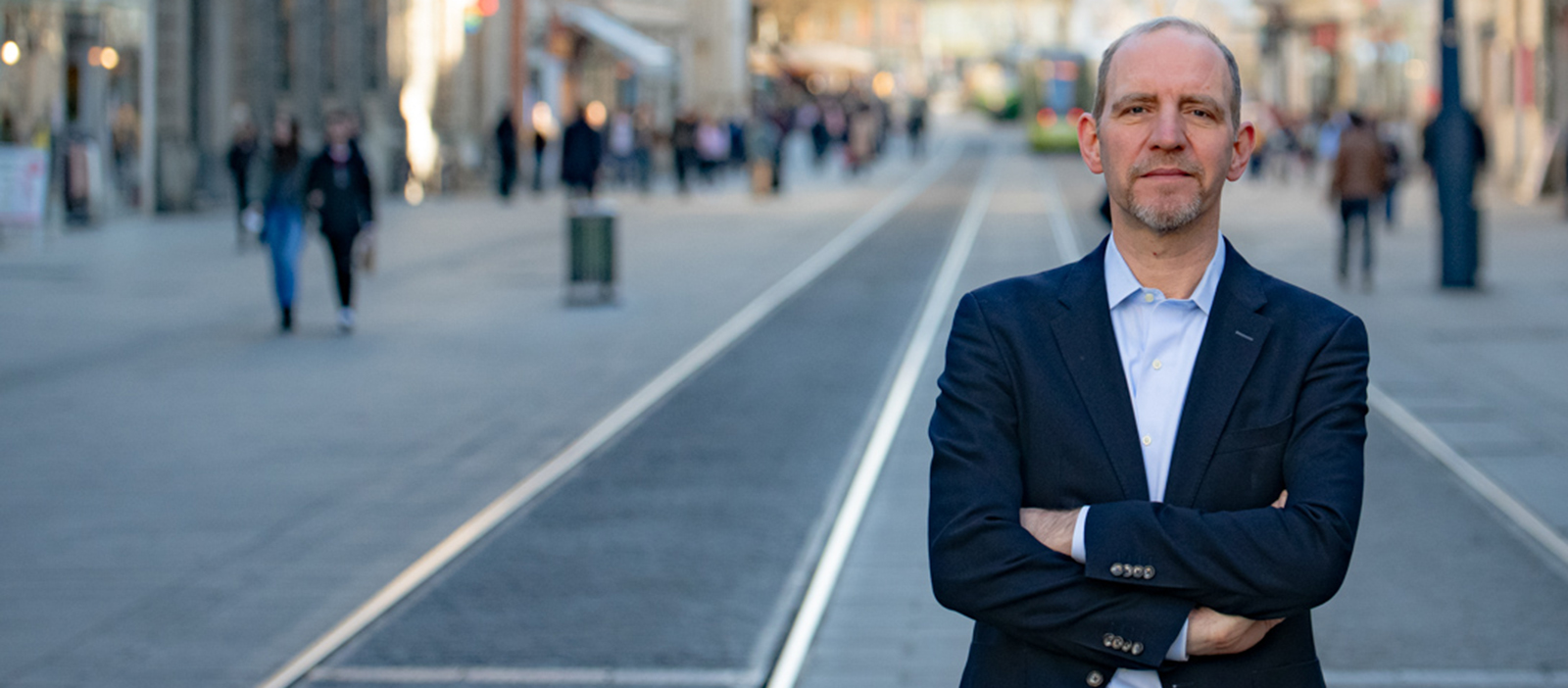
Florian Bieber Q&A: ‘There is an Islamophobic subtext to the narrative about Albania’
Photograph courtesy of Florian Bieber/Uni Graz/Tzivanopoulos
The political scientist on dangerous national stereotypes and what the war in Ukraine means for western Balkan states hoping to join the EU
–
With the Russian invasion past the one-year mark, President Volodymyr Zelensky has urged European Union leaders to open EU membership talks with Ukraine this year — a development that could have seismic ramifications across the region. Florian Bieber is a political scientist and historian working on interethnic relations, ethnic conflict and nationalism, focusing on south-eastern Europe. He is a professor and director of the Centre for South East European Studies at the University of Graz in Austria. He also coordinates the Balkans in Europe Policy Advisory Group and is president of the Association for the Study of Nationalities.
This article has been edited for length and clarity.
Volodymyr Zelensky made an impassioned speech last week, making the case to speed up Ukraine’s membership of the EU. Is that really going to happen?
In many ways, the urgency is much greater for Ukraine than for other nations. That is why it got candidate status so quickly. However, I think there’s great reluctance to actually start accession talks, because that would be a much more serious commitment on the EU side. Even if that were to happen, this process is quite long — countries like Montenegro have been negotiating for a decade. Nobody is anticipating that Ukraine is going to overtake western Balkan nations.
What are the barriers to Ukraine joining the EU at a faster pace?
Some member states are very enthusiastic about Ukraine, others are much more reserved. There are fundamental structural problems about taking Ukraine into the European Union, including the size of the country. It is also hard to imagine that it could join the EU before the war is concluded. Even if it is, if territories are under occupation, how would that work? There are lots of questions. The expectation would be that things will slow down as the practical side of the process kicks in.
What is the current situation regarding countries in the western Balkans joining the EU?
There are two parts to this: how far countries are, technically, along the path to membership and how far they have been able to integrate EU law and rules. For example, North Macedonia is further ahead than Serbia on the latter. But, on the technical level, Serbia and Montenegro have been negotiating for a number of years, so they are furthest along the path. In the next tier, Albania and North Macedonia have begun the first stage towards accession talks. Then there’s Bosnia, which, like Ukraine, has candidate status, but has not been offered the chance to start talks yet. Finally, there’s Kosovo, which is not a candidate for membership, mostly because five countries in the EU don’t recognise it as a nation.
Do you think the fact that several of the countries in the Western Balkans have large Muslim populations, or are majority-Muslim in the case of Albania and Kosovo, has affected their acceptance by other EU members?
Generally speaking, there is less prejudice towards Muslim-majority countries in the western Balkans than towards Turkey. For example, Austria has a very hostile view of Turkey and of it joining the EU, whereas the view on Bosnia joining is much more positive, partly because it is seen as less threatening.
However, you do have some degree of anti-Albanian sentiment. France blocked accession talks with North Macedonia and Albania. The main reason was the idea, similar to what we hear now in Britain, of Albanians migrating to France, living off the welfare state and being involved in organised crime. There is an Islamophobic subtext to that narrative. I remember talking to French deputies when that happened. They were like, “Oh, they’re so poor and backward…” They wouldn’t name Islam as a factor, but I believe that it feeds into those stereotypes.
What effect do you think the drawn-out process of accession has had on the western Balkans?
There’s a general sense of frustration with the process and of it having lost its way. In Serbia, supporters of joining the EU are now in a minority. People in the region have become very sceptical that it will ever happen. Albanians and Kosovans are still very optimistic about it, perhaps unrealistically.
And how have the western Balkan nations responded to Ukraine becoming a candidate for EU membership so quickly?
With the exception of Serbia, they have been basically trying to signal their alignment with western foreign policy when it comes to Russia. So they’ve been supporting Ukraine at that level. There is also a certain level of resentment, especially in countries like Kosovo and Bosnia, which are the furthest down the road. They feel like they’ve been held up while Ukraine is getting privileged treatment.
Topics
Get the Hyphen weekly
Subscribe to Hyphen’s weekly round-up for insightful reportage, commentary and the latest arts and lifestyle coverage, from across the UK and Europe
This form may not be visible due to adblockers, or JavaScript not being enabled.